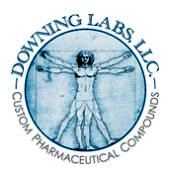- State oversight of compounding pharmacies varies dramatically (statnews.com)
Amid ongoing safety concerns over compounding pharmacies, a new analysis finds state oversight is a spotty patchwork of regulations, raising questions about the ability to protect the public health.
- Only about half of the states require compounding pharmacies that make sterile medicines, which are injected or infused into the body, to fully comply with recognized quality standards.
- 60 percent of the states do not require compounding pharmacies to report serious adverse events and reactions related to sterile compounding...
- 16 states reported they do not track compounding pharmacy activity at all.
- 28 states allow traditional compounding pharmacies as opposed to those that make large amounts of medicines for hospitals to provide drugs without prescriptions for individual patients. This practice conflicts with??federal law.
- nine states do not plan on taking any action, such as requiring compounders to register with the FDA or disciplining these businesses.
- 53 percent of the states conduct annual routine inspections for in-state pharmacies that perform sterile compounding.
- any issues discovered during an inspection, 79 percent of the states requires a written response from the pharmacy describing how the issues were addressed,
- 67 percent also need an additional on-site inspection to verify compliance.
- one-third of the states do not perform on-site follow-up inspections to verify needed changes.
- Most of the states...have the authority to issue cease-and-desist orders, but 70 percent also said they were unable to mandate a recall of compounded drugs or were unsure of their explicit authority.
- Collaborative Practice Agreements Open Opportunities, Liabilities for Pharmacists (pharmacytimes.com)AMCP - Where We Stand - Collaborative Drug Therapy Management (amcp.org)
...48 states and the District of Columbia, pharmacists’ scope of practice allows for collaborative practice agreements with prescribers—although each state has its own rules and nuances about what, where, and with whom pharmacists can collaborate... Antonio Ciaccia...Ohio Pharmacists Association... the state’s new collaborative practice agreement laws will have a major impact on all pharmacy practice settings, including compounding, long-term care, hospital, ambulatory, community, and consulting. While he believes that pharmacists have "more than adequate training" to perform the services permitted under the new law... Because of the variations in state pharmacy practice acts, pharmacists can best defend themselves against such liability claims by taking the time to familiarize themselves with the authority granted to them under their collaborative practice agreement to ensure that they do not exceed that authority. Pharmacists may also check with their malpractice insurance carrier...Despite the increased potential for malpractice and liability issues...expanded collaborative practice agreement law as a victory for prescribers, pharmacists, and patients...engagement of the pharmacist on the health care team is a great driver for improving outcomes...
- Pharmacies Won’t Compound Lethal Injection for Alabama Executions (pharmacytimes.com)
Alabama recently executed its first inmate using a 3-drug cocktail containing midazolam in place of the more commonly used pentobarbital...This is because compounding pharmacies in Alabama were not willing to make pentobarbital for lethal injection...Four other states’ pharmacies also declined to compound pentobarbital for the Alabama Department of Corrections...Both the International Academy of Compounding Pharmacists and the American Pharmacists Association have issued statements discouraging pharmacists from participation in executions...IACP said compounding lethal injection drugs goes against pharmacists’ focus on healing and care. It also pointed out that state boards of pharmacy could potentially seek ramifications against a pharmacy that knowingly prepares a drug that will cause harm...With manufacturers and compounding pharmacies’ resistance, state departments of corrections may have to turn to alternative methods for executions...in April 2015, Oklahoma approved the use of nitrogen hypoxia in a gas chamber if the state could not obtain lethal injection drugs...In Utah, Governor Gary Herbert signed a law in March 2015 that allows for the use of a firing squad as a plan B.
- Compounding Pharmacy Forced to Stop Production Due to Insanitary Conditions (specialtypharmacytimes.com)Federal judge enters consent decree against Downing Labs (fda.gov)FDA sues to stop a wayward drug compounder (statnews.com)
Compounding pharmacy Downing Labs LLC (formerly known as NuVision Pharmacy), its co-owners, and its pharmacist-in-charge have been issued a consent decree of permanent injunction...The Texas-based company is allegedly in violation of current good manufacturing practice requirements under the Federal Food, Drug, and Cosmetic Act...Downing Labs is accused of manufacturing and distributing adulterated drugs that were made in insanitary conditions, meaning they were bad enough to endanger public health...“Despite multiple warnings to the company, Downing Labs continued to manufacture injectable drugs under insanitary conditions, putting the health and safety of patients at risk,”...“The FDA pursued appropriate and aggressive action to protect the public health.”...Downing Labs said it has worked "collaboratively and cooperatively” with the FDA to reach an agreement that will enable it to resume the production of compounded sterile medication...also noted that, as part of the consent decree, it voluntarily agreed to participate in a regular program of testing, audit, and inspection “to ensure it is achieving and exceeding its quality goals.”
- 3 compliance rules pharmacies must know (drugtopics.modernmedicine.com)
With 2016 well underway, pharmacies of all sizes should review recent regulatory updates to ensure compliance with rules already in effect, and preparation for those to be implemented soon. Three, in particular, warrant a close look.
USP 797 Pharmaceutical Compounding – Sterile Preparations. The comment period for USP’s proposed revisions for compounding sterile preparations closed January 2016, and comments are now under review. If finalized as-is, USP 797 may publish by November 2016, at which time pharmacies will face significant changes...
USP 800 Hazardous Drugs – Handling in Healthcare. This was approved and published in February 2016. It defines hazardous drug containment processes to promote patient safety, worker safety, and environmental protection...
Drug Supply Chain Security Act. Enacted in November 2013, this sets forth requirements to build electronic systems to identify and trace certain prescription drugs in the United States. Pharmacies should consider which aspects of the law they’re held accountable for now, and which aspects they will be held accountable for in the future...
- Compounding pharmacies investigated for possible fraud tied to pain creams (healthcarefinancenews.com)
The Department of Justice is investigating potential fraudulent claims and billing linked to specialty creams...that claimed to treat pain symptoms...investigators have claimed many of these specialty creams have little or no medicinal value...the issue is with the alleged false claims, not the compounds themselves...It's part of a larger issue of healthcare fraud...All these people submitting claims … for drugs that have absolutely no effectiveness. Are they doing it with knowledge, and seeking reimbursement for it? It's the modern day snake oil salesman...the International Academy of Compounding Pharmacies said the creams in question "benefit people and are non-addictive."...No charges have been filed...
- Washington’s Prescription For Cheaper, And Unregulated, Medicines (forbes.com)
In 2011, in an effort to bring a lower-cost drug to the market, the Food and Drug Administration was forced to accept the widespread compounding of a specialty drugs...The agency’s submission involved an old, and previously cheap, generic medicine that had secured some renewed exclusivity, and was being sold as a higher-priced specialty drug. But the FDA’s move deliberately undermined the agency’s own approval requirements...It sent an unambiguous message that FDA wouldn’t try to enforce its already weakened authority over compounding–so long as the price of the knock-off drug was right...The compounding of drugs grew precipitously over the next few years...the passage of the 2013 Drug Quality and Security Act...closed loopholes that allowed compounding outfits to operate beyond the bounds envisioned when the local practice of pharmacy was carved out from typical FDA oversight...some are seeking to co-opt some key provisions in that law as a way to once again expand compounding well beyond the practices’ historical concept. Once again, these efforts are being insincerely waged in the name of increasing drug competition and lowering costs…The co-opting of the practice of pharmacy compounding in this manner also puts the entire practice of pharmacy at risk. Compounding remains an important pharmacy activity...But each time outfits try to exploit the practice simply as a way to evade traditional regulation of drug manufacturers; they create risks and bad outcomes that ultimately lead to new restrictions. That was the legacy of the 2013 passage of the DQSA. Now some who instigated that law want to do it all over again.
- ASHP Expresses Major Concerns with Proposed Revisions to Chapter <797> Standards, Offers Recommendations (ashp.org)
A number of proposed changes to the U.S. Pharmacopeial Convention General Chapter <797> Pharmaceutical Compounding — Sterile Preparations standards are incompatible with the medication-use process in patient care environments, ASHP stated in comments submitted to a USP expert panel earlier this month...ASHP points out that many of the new requirements are more appropriate for making drugs from bulk chemicals in compounding pharmacies or outsourcing facilities than for preparing medications for administration in patient care settings. The letter urges the expert panel to revise the proposals to better meet the urgent and unpredictable demands of the typical acute patient care setting...ASHP’s letter encourages USP to reorganize the standards into separate sections covering basic and advanced compounding as well as the preparation of special compounded sterile products such as radiopharmaceuticals and allergenic extracts.
- New Ohio law expands pharmacists’ care (pharmacist.com)
Congratulations to our pharmacist colleagues in Ohio! Under a new bill that was recently signed into law, Ohio pharmacists will now have more responsibility and fewer restrictions in collaborative practice...HB 188 provides new consult agreement provisions that allow Ohio pharmacists to order blood and urine tests, analyze the results of those tests, and modify a patient’s drug therapy regimen. The law also allows pharmacists to order medication refills in a small amount for patients with life-threatening illnesses when a physician can’t be reached. It will also streamline consult agreement paperwork so that multiple pharmacists can have a collaborative agreement with multiple physicians to oversee medications for multiple patients...This is a huge win for pharmacists in Ohio and is an excellent example of how collaboration among pharmacists, physicians, patients, and legislators can expand our scope of practice...
- Express Scripts sued by compounding pharmacies for alleged antitrust practices (statnews.com)
For the second time since Express Scripts began blocking coverage of hundreds of ingredients used to make compounded medicines, several compounding pharmacies have filed a lawsuit accusing the pharmacy benefits manager of using illegal tactics...In the latest instance, a half-dozen compounding pharmacies have charged Express Scripts with violating antitrust laws and is attempting to force them out of business...Express Scripts has taken “a series of unreasonable restrictions and rules that would make it impossible for [the compounding pharmacies] to fill prescriptions” for patients “and obtain reimbursements that would cover their costs,”...The company and the other benefits managers “employed tactics designed to ensure that the compounding pharmacy industry …cannot survive.”...The move to cut back on covered ingredients has riled compounding pharmacies...the Food and Drug Administration has cracked down on compounding pharmacies by increasing the number of inspections, and, in rare cases, taking legal action to halt allegedly unsafe practices. The justifiable emphasis on safety has forced many compounding pharmacies to enhance operations...The compounding pharmacies are striking back. In November 2014, three others filed a lawsuit claiming Express Scripts illegally blocked legitimate prescriptions and unfairly forced patients to seek more expensive medicines or simply not seek treatment. The pharmacies maintained the benefits manager violated federal law because it lacks authority to essentially alter terms of health plans.






